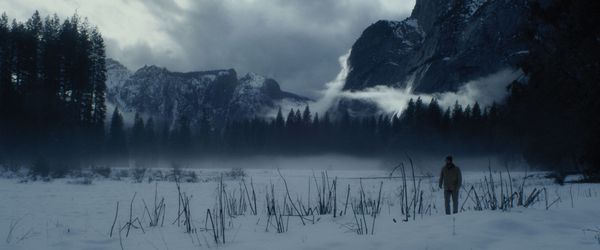Eye For Film >> Movies >> Sator (2019) Film Review
Sator
Reviewed by: Jennie Kermode

Sator, an unnerving, poetic horror film set in remote woodland in northern California, is billed as the work of one man. Jordan Graham wrote, directed, produced, shot, managed light and sound, edited and wrote the score. He even built the log cabin where much of it is set, giving it a weathered look at the speaks to the family legacy at the heart of the story. But did he really create it, or did someone - of something - else have a hand? That's the question you might find yourself asking when you learn that his own grandmother, June Peterson, is the source of the sinister character who haunts its hero, a manipulative character said to have an interest in families, for whose sake Graham made ongoing adjustments to his work.
Peterson appears here as Nani, the hero's grandmother. Both actress and character - the two are really one, just in different contexts - are suffering from dementia and, on request, reciting a story to a hidden listener. This concerns the aforementioned Sator, who as visited Peterson/Nani since childhood, making its presence known as a voice in her head. A friend, a caring presence, or so it seemed to the child. As she talks, though, a different sense of their relationship emerges. Sator persuaded her to do and say certain things, she says. At times she speaks for it; on another occasion we see her engaged in automatic writing, supposedly the taking of dictation, though it's difficult to decipher.

There are the makings of a fascinating documentary here - a reminder, among other things, that we listen far too little to those declining in that way and fail to gain the benefit of their shifted perspectives - but such a film would likely have reached only a small audience. By combining it with fiction, Graham has created something truly distinctive. The superimposition of the Sator narrative atop material he had already filmed with a different story in mind gives it the depth of folklore and a disjointed aspect which contributes to its disturbing effect. The story that emerges is inconsistent and confusing in places, but there's a compulsive power to it, as is often the case with a well crafted mystery which offers no satisfying answers.
it is a characteristic of dementia that it leaves those who experience it alone, cut off in their remote worlds even as others come and go around them. There's a neat parallel here with the physical isolation of the film's main protagonist, Adam (Gabriel Nicholson), who lives a primitive existence yet who, it soon emerges, is living in modern times and has relatives not far away. His exile among snow-covered mountains seems to stem from a desire to protect him or, perhaps, to sacrifice him. Something is lurking in the woods, among the trees where old stories converge. There is a plainness about this mysterious figure, a stillness, which mirrors the state of serenity that some dementia patients achieve. It is fascinating in its blankness yet unnerving, also, because of the complete lack of moral reference points. From where we stand, it cannot be understood. At least not without opening up to it, as Nani has done (and perhaps Adam's mother, too - there are numerous hints of family tragedy). The danger of that is less clear; the fact that it could be the only solution to the mystery tempts us anyway.
Other strange figures come and go. There is a curious mention of 'us'. Are they different creatures or aspects of the same thing? Crowning antlers hint at mythic figures. Is all of this, ultimately, in Adam's head, an expression of inherited mental illness? Graham keeps us guessing.
"I don't remember you," says Nani, puzzled upon meeting Nicolson.
"I'm your grandson," he says gently, telling her that they met just the other day.
Having nothing else to guide her, she accepts it. Perhaps Sator knows what's going on, but if so, it chooses to stay silent.
Reviewed on: 09 Feb 2021















